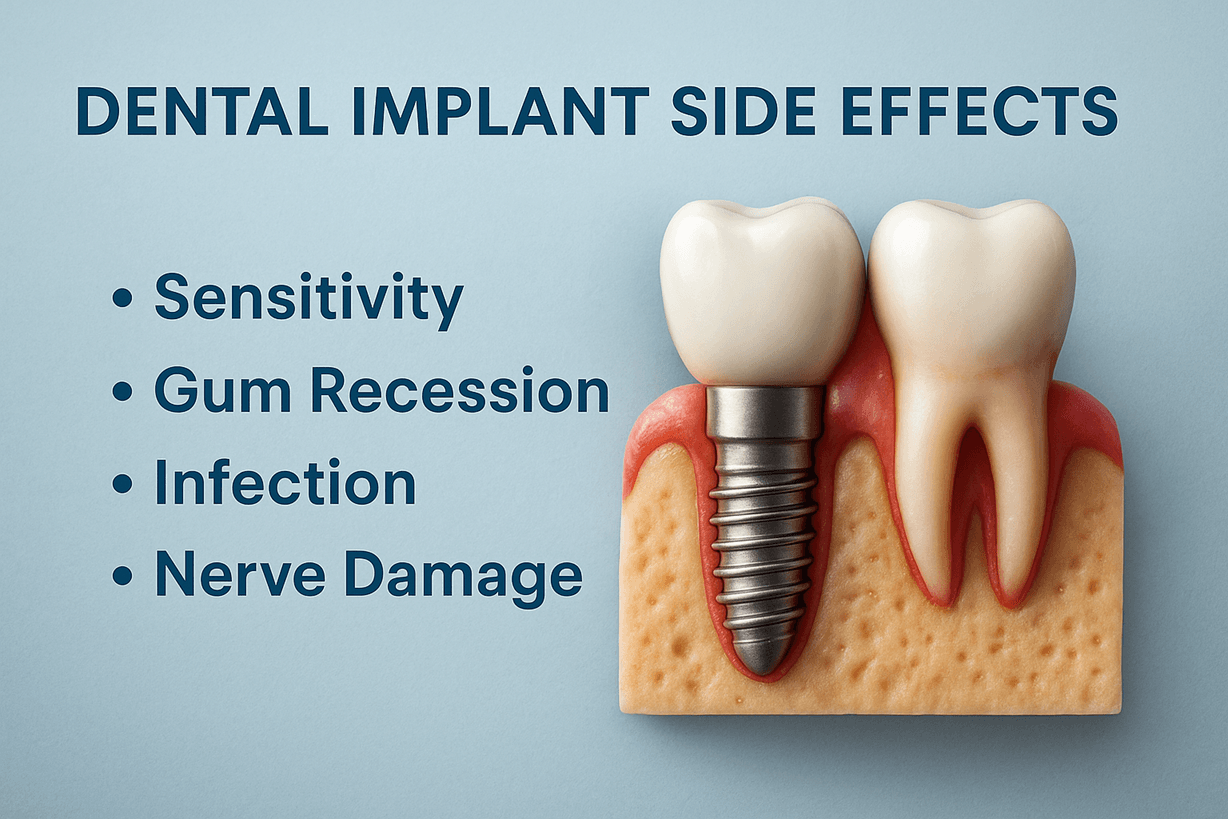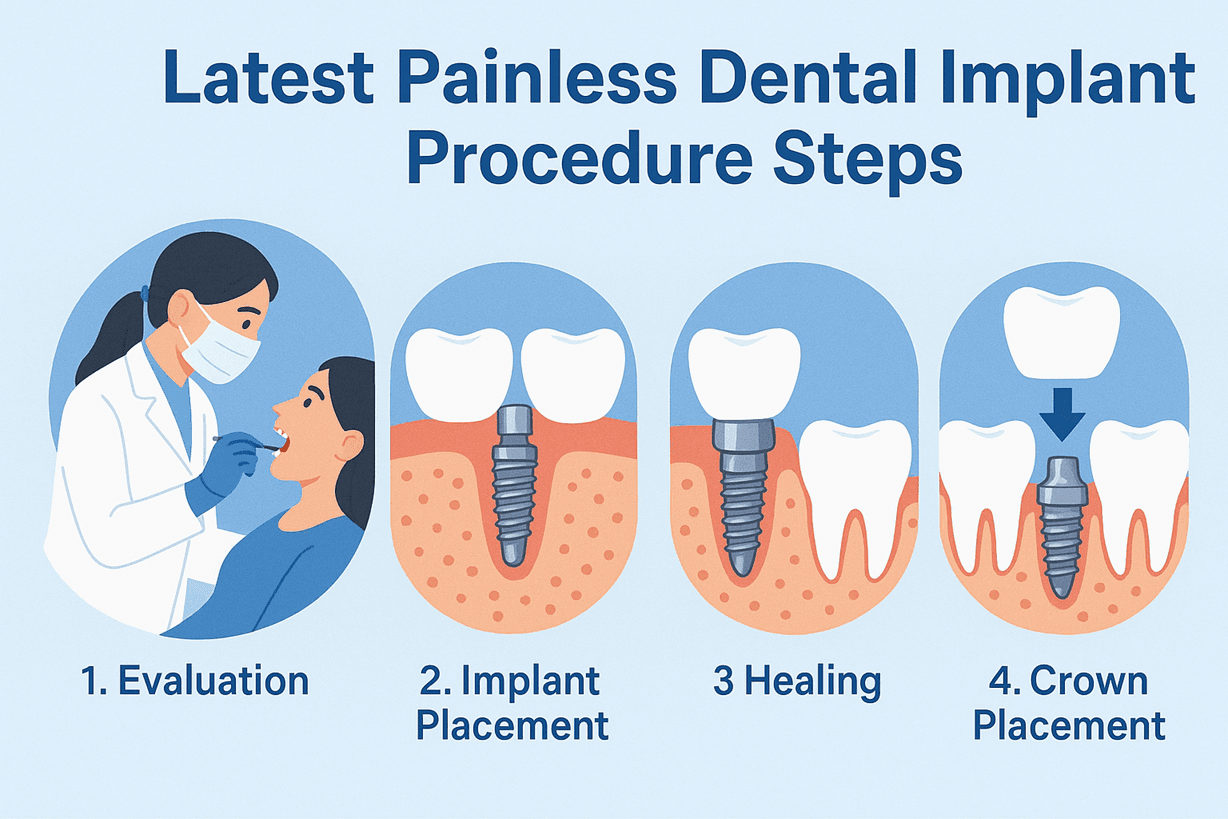Contents

It's critical to understand the advantages and disadvantages of both root canal and implant treatments if you're debating either procedure.
We'll compare and contrast the two therapies in this blog article and give you the details you need to make a wise choice.
We'll go over each treatment's advantages and disadvantages and provide advice on how to select the best course of action for you.
Read on to learn everything you need to know about these common dental procedures, whether you're thinking about getting a root canal or an implant.
What Is A Root Canal?
A root canal is a dental operation used to remove diseased or damaged internal tooth tissue. The nerves and blood vessels that keep the tooth alive are located in this tissue, which is referred to as the pulp. Through a small aperture in the tooth, the pulp is taken out, and the root canal is then cleaned and sealed.
It is a method for saving a tooth that has suffered significant damage or is infected. Cleaning out the tooth's damaged or infected area is the first step in the procedure, followed by filling and sealing it.
Depending on the extent of the infection or damage, a root canal can be completed in one or two dental visits. When a tooth has suffered extensive deterioration due to unattended cavities, root canal therapy is frequently required.
When decay penetrates into the pulp, the tooth's innermost layer, it may result in discomfort, sensitivity to heat and cold, and even an abscess (a pus-filled pocket).
The only option to save the tooth in these situations and get pain relief is through a root canal. Another factor that could necessitate a root canal is infection.
A tooth crack or chip that allows bacteria to enter the pulp might result in an infection. Pain, oedema, and even fever can be brought on by an illness. In most cases, a root canal is necessary to eliminate the infection and save the tooth.
Do not delay to have a root canal performed if you suspect that you may need one. Call your dentist as soon as possible to schedule an examination. Delaying treatment could result in further damage to your tooth or even loss of it.
What Is An Implant?
A metal rod is surgically inserted into the jawbone as part of an implant surgery to replace a lost tooth. The rod, which is typically made of titanium, is inserted into the jawbone through a tiny gum incision. A fake tooth (known as a crown) is affixed to the metal rod after the implant has healed.
A dental implant is a durable tooth replacement option. The implant is put into the jawbone and given time to fuse with the bone. Once the fusion is complete, the dentist then places a small metal post in the implant which protrudes above the gum line.
A false tooth (or teeth) is then attached to this post. For people who have lost one or more teeth due to injury, illness, or decay, dental implants are a wonderful choice. Implants are also a good choice for people who do not want to wear dentures or bridges.
However, they are not right for everyone. Another disadvantage of dental implants is that they may be fairly costly. They also require surgery and a lengthy healing period. This means that they are not an option for everyone.
Before you decide whether or not to get dental implants, it is important that you educate yourself about the procedure and what it entails. You should also speak with your dentist or another oral health professional to see if implants are right for you.
Root Canal Vs Implant:
When it comes to dental health, few things are more daunting than the prospect of needing a root canal or an implant. Both procedures can be anxiety-inducing, but the good news is that they're both safe and effective treatments for serious tooth issues.
Knowing how they differ from one another and properly considering your selections are the keys. We'll compare root canals and implants in this blog article to help you choose which option would be best for you. So take a seat, unwind, and get ready to discover everything there is to know about these two basic dental procedures!
Root Canal Vs Implant Pros And Cons
A root canal or an implant are the two primary alternatives for treating a tooth that is badly decaying or infected.
The best course of action for you will depend on the particulars of your case as both approaches offer advantages and disadvantages.
The primary distinctions between root canals and implants are outlined as follows:
Root Canal Pros:
Relief from pain - A tooth that is infected or inflamed may be excruciatingly painful. The damaged tissue and germs will be removed through a root canal, relieving the pain.
Save your tooth - Your tooth may need to be extracted if the damage is serious. However, if a root canal is an option, it may be able to save your tooth and preserve your smile.
Avoid further damage - If an infection is left untreated, it can spread to other teeth or even to other parts of your body. By having a root canal, you can avoid further damage and keep your mouth healthy.
During a root canal, the damaged or infected tissue inside the tooth is removed, and the tooth is then filled and sealed. Root canal therapy keeps the tooth's original structure.
Root canal therapy can keep teeth from being pulled that would otherwise need to be removed.
The dentist may need to see you several times for root canals. Root canals can usually be finished in one or two dental appointments, whereas implants may need several surgeries.
After a root canal, there is a reduced chance of complications and an even reduced risk of infection.
Root Canal Cons:
To avoid re-infection, root canals require continuing care, including frequent examinations and cleanings.
Although a popular and generally straightforward surgery, root canals may have certain disadvantages.
First and foremost, if you don't have dental insurance, root canals can be rather pricey.
Additionally, the procedure itself can be quite painful, and you may need to take pain medication afterwards.
Finally, there is a small risk of infection after a root canal, which may require additional treatment. If you are considering a root canal, be sure to discuss all of the potential risks and benefits with your dentist beforehand.
Implant Pros:
An implant is a metal device that is surgically inserted into the bone of the upper jaw or lower jaw to serve as an anchor for a false tooth or teeth.
Improved appearance: An implant looks and feels like your own tooth, and it becomes permanently fixed in place.
Enhanced chewing function: An implant restores biting and chewing ability, making it easier to eat the foods you love.
Improved speech: Implants eliminate the clicking or slack sound that can occur with dentures.
Durability and stability: With proper maintenance, an implant can last a lifetime.
Enhanced comfort: Because implants become part of you, there aren't any feelings of discomfort or irritation associated with wearing them.
Convenience: No special care is required to clean implants; simply brush and floss as you would your natural teeth
Implant Cons:
Cost: Implants are usually more expensive than other tooth replacement options, such as bridges or dentures.
Time commitment: The placement of implants requires multiple surgical procedures over several months.
One of the main risks is dental implant failure, which can occur if the implant does not fuse properly with the jawbone or if it is subject to excessive force. This can lead to pain, infection, and damage to surrounding teeth.
There is also a small risk of nerve damage when getting dental implants. In rare cases, this can cause numbness in the lips or gums.
Finally, dental implants are typically more expensive than other types of tooth replacement options such as dentures or bridges.
Which One Is Safer?
A root canal is a treatment to repair and save a tooth badly decayed or infected. The technique consists of removing the injured tissue from within the tooth, washing and disinfecting it, and then filling and sealing it.
A titanium screw known as an implant is inserted into the jawbone to serve as a natural tooth replacement. Over time, the implant integrates with the bone and offers a sturdy base for an artificial tooth.
Both root canals and implants have advantages and disadvantages. It is crucial to explore your options with your dentist and take into account your unique needs when determining which operation is best for you.
How To Make The Decision
When selecting whether to get a root canal or an implant, there are a few things to think about. The first is the extent of your tooth's damage.
The best approach may be an implant if the damage is severe. An implant will also be a better option if you have had multiple root canals or if you have other health conditions that make a root canal riskier.
Cost is the second aspect to take into account. A root canal can be a better choice if you're on a tight budget because implants can be fairly pricey.
The final element to take into account is recuperation time. A root canal typically takes only a short amount of time to complete and requires little rehabilitation. The recuperation period following implant surgery is longer and more invasive.
The choice between a root canal and an implant should ultimately be chosen by you and your dentist depending on the extent of the tooth damage, your financial situation, and your preferences for the length of the recovery period.
Conclusion
With root canal vs implant, there is a lot to consider when making an informed decision. Root canals have been around for years and can often provide excellent long-term results but implants are a newer option that offers many advantages.
Ultimately, it comes down to your situation, the advice of your dentist, and ultimately what works best for you. Root canals may take a few visits to the dentist, but they are generally less expensive than implants.
Implants are designed to last for many years and mimic natural tooth function more closely than a root canal does; however, it is an invasive procedure that requires surgically inserting an artificial tooth into your jawbone.
Whichever route you take, speak with the nearest dentist about which treatment plan is best for you so that you can make the most informed decision on how to improve or maintain your oral health and make sure you understand all of the pros and cons before making any decisions about which procedure is right for you.
Your dentist will be able to advise you on which one is best for you depending on your individual needs and circumstances.
Ultimately, no matter which option you choose, rest assured knowing that modern dental treatments have made it possible to achieve a healthier, safer smile with either procedure.



